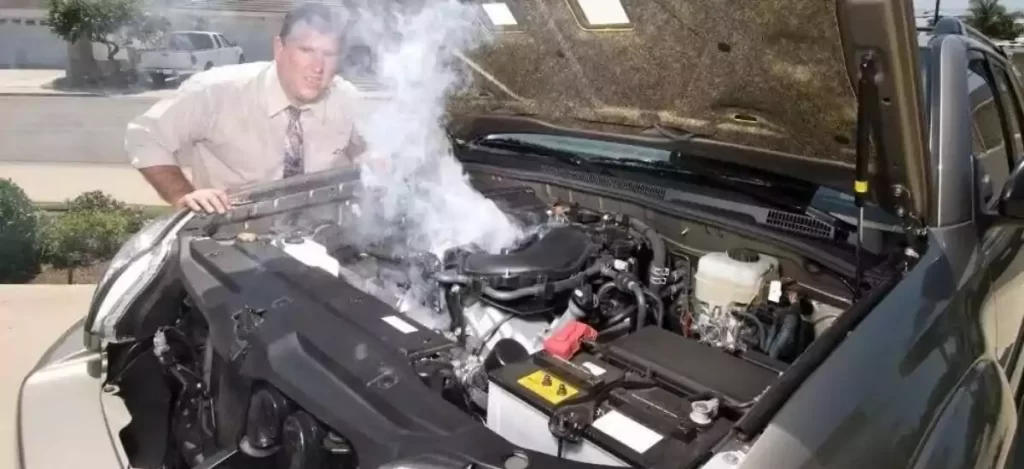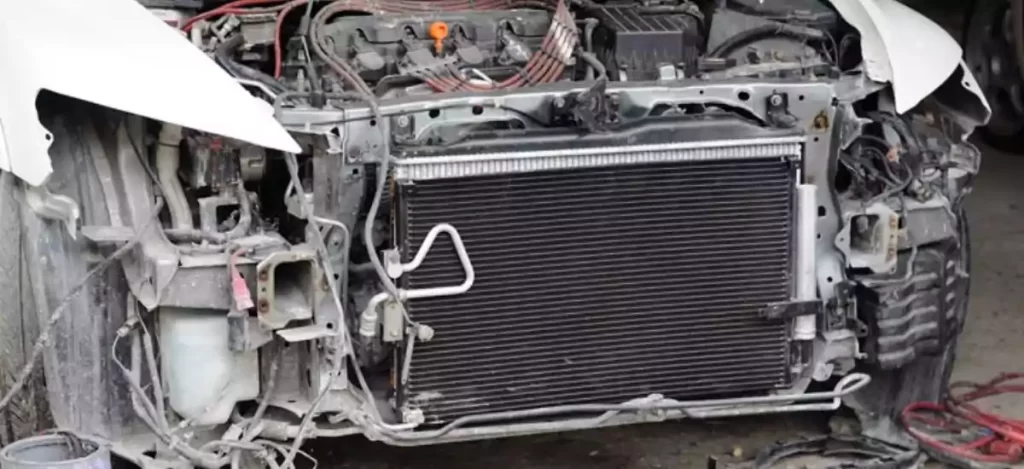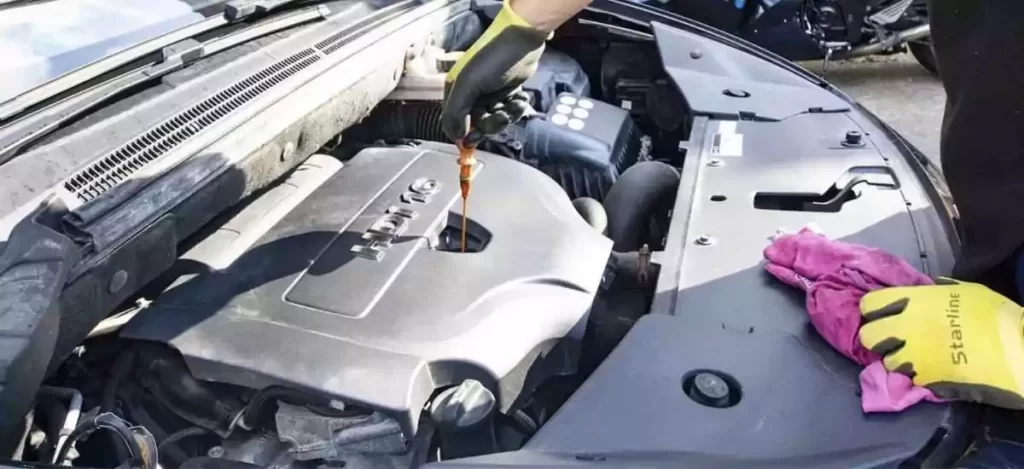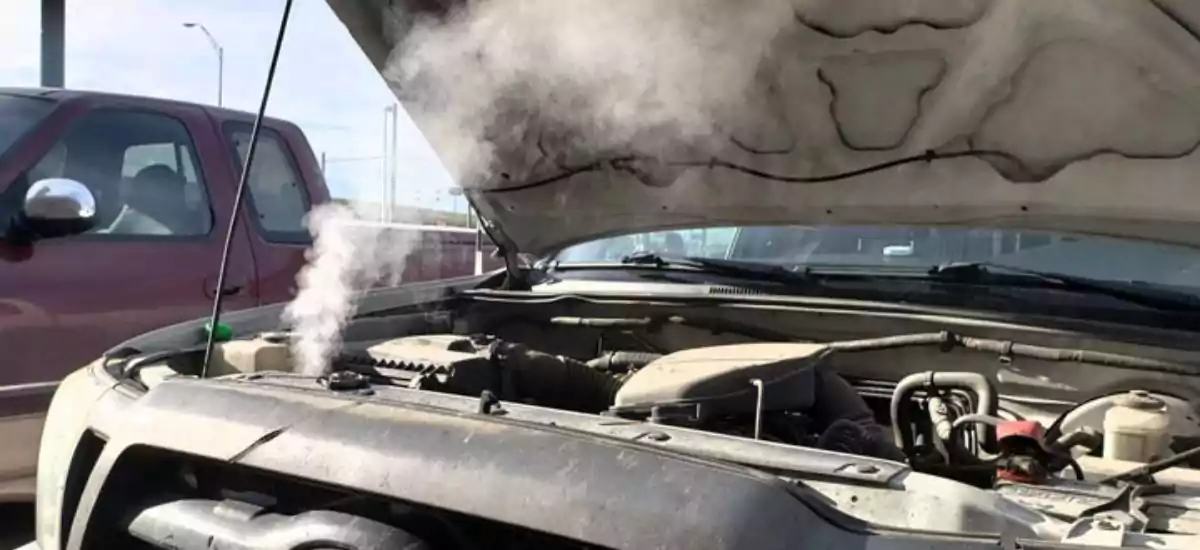If your car overheats after driving it for longer periods of time, this could mean you have an issue with your cooling system or your thermostat.
If you are in a car and you discover that the car is overheating, avoid driving ahead or any farther. Next, you need to pull over, stop driving and then turn off the vehicle immediately.
The very next step that you should take is to take the best course of action and take the vehicle towed to your nearest auto service center.
In this article, we will be giving you a vivid snapshot of how you can spot that your car is being overheated. And, what you should do to get it fixed.
Reasons Why Your Car Overheating Then Going Back To Normal
Before we delve into the topic, we should first figure out the symptoms of engine damage from overheating and then walk ahead toward better prevention.
Here is a list of the reasons why cars get experience overheating. Let’s start-
1. Bad Thermostat
A bad thermostat is one of the most common causes of an overheating car. The thermostat regulates the flow of hot water to and from the engine to control the temperature of the entire vehicle.
A higher overall temperature is associated with more hot water near the engine, whereas a lower overall vehicle temperature is associated with less hot water near the engine. When a thermostat fails, the control of water and, consequently, temperature becomes irregular, leading to overheating in your vehicle.
2. Low Coolant Levels
Before we jump into the causes any further, let us see what the works of a coolant system is or perhaps why a car begins to overheat. It is good to understand what an engine is and why there is a need for coolant for the engine.
The problem of coolant occurs when your vehicle encounters an underlying issue. It is based on the coolant leaks and problems that can evacuate heat from the engine. This problem happens when your oil cooler leaks or the head gasket sees the damage.
Here’s why a coolant is important.
- The cooling system maintains the standard operating temperature for the engine by circulating coolant
- Low coolant levels indicate immediate repairing of the system or else you can experience an overheating
- Using antifreeze through the engine to the radiator can pull off the heat away from the engine

3. Belt Bummer
If the car is overheating and then cooling down for no apparent reason, you must inspect the case and then take the final call. It may so happen that the Belt bummer is having an issue. But then how will you spot the problem? Here’s how-
- A snagged belt in your car might cause the engine to overheat
- The belt rotates the pump, allowing it to push cooling throughout the system
- The pump cannot turn and dispense coolant if the engine belt is out of position
- Keep all of these belts greased and tight to minimize engine problems, but don’t let anyone lose one
- The engine belts are integrally tied to the operation of a water pump
4. Defective Radiator
The job of the radiator is to radiate heat away from the engine, removing some of the heat accumulated there. If the radiator fails, heat will build up quickly in the engine. Unfortunately, the heat isn’t easily distributed; it will eventually lead to your automobile overheating after a short time.
If your radiator is defective or faulty, then you should immediately visit the nearest service center immediately without delay.
- The problem with the radiator occurs when the radiator fan hardly works properly
- If the radiator is found to be faulty, the car will overheat and lose coolant faster than its normal speed
- If the temperature gauge fluctuates constantly, then you will experience an overheating of the car
- If the radiator has clogged or dirt in it, it will not allow the proper flow of the coolant through the engine
5. Leaking Water Pump
Another reason why cars overheat is the leakage in the water pump. It could be a sign of a leaking water pump if your automobile overheats while driving. When a water pump reaches the end of its functional life, this problem occurs. Your car will most likely overheat and lose coolant more quickly than usual when this happens.
You might find that sometimes the car heats up when idling but cools when driving. A regular checkup of the car will always help you find the best solution. A good automobile expert will always make you aware of the time-to-time service you need to do for your car a better longevity.
6. Plugged Heater Core
Another reason that the car overheats can be the outcome is the poor condition of the plugged heater core. While traveling on frigid days, the heater core keeps you toasty.
It is essentially a heat exchanger that controls coolant flow, and if it gets clogged, it can cause your car to overheat. An uncontrollable rise in automobile temperature is a common indication of this. You need to fix the issues immediately.
7. Low Engine Oil Levels
The levels of the engine oil may go low if your car/ any other vehicle is overheating. It can happen if the engine in your car doesn’t provide enough lube or grease to the mechanical components. When this happens, you will notice that the temperature indicator continues to climb and decrease, indicating that your engine oil level has a problem.
Also Read :
How Many Axles Do Cars Have?
How Many Quarts of Transmission Fluid You Should Add to Ca
What To Do If Your Car Is Overheating And Then Going Back To Normal
Sometimes a very common question that comes up is- why is my car overheating with a new thermostat? At the beginning of this content, we have introduced our readers to the possible 7 causes that can overheat a car and can become a huge issue in the future.
Thus, all you need to do is to visit the nearest service station where an expert is there to treat the issues with strict hands-on urgent notice.
So, here are some guidelines which you need to do when you find that your car is overheating-

1. Perform a Vehicle Diagnostic to find the Main Cause
It is best to perform the diagnosis of the vehicle and get the issues fixed on time. Performing a vehicle checkup will make you aware of the problems and then you will be able to dig out the root cause behind the car’s overheating. When issues come up, you must know how to inspect them. Having your car treated by a professional mechanic and technician will be a perfect decision.
2. Replace the failing Radiator
You should go for radiator replacement if the automobile mechanic suggests you do so.
- If you notice that your vehicle is overheating and then cooling down, the problem could be a faulty radiator.
- This component is critical for keeping the engine cool since it promotes coolant flow throughout the whole engine system.
- Your vehicle may overheat; as a result, resulting in catastrophic results.
3. Turn On The Heater
The next option is to drive the car with the heater turned on. It may be scorching hot inside your car, especially in the summer, but moving that heat away from the engine may allow it to last until you get home or to a mechanic. However, keep in mind that this is only a first aid until the issue is permanently resolved.
4. Replace The Failing Thermostat
If you discover that your automobile is overheating due to a faulty thermostat, you should take it to a mechanic to have it repaired. It is a fairly frequent issue, so fixing it shouldn’t be too difficult.
- Your car’s engine and the thermostat is essentially a valve that controls coolant flow
- The seal on this pipe opens when the engine is heated, allowing fluid to cool the engine
- A blocked valve seals off all fluid in a cold engine, causing the automobile to warm even faster than it should
- No matter how cold the car is, coolant cannot flow through it
- It is also a major issue that could lead to your vehicle overheating
5. Look For Coolant Problems
A lack of coolant could be the cause of you’re car’s overheating. When this happens, the temperature measurement will rise, and the car engine will begin to overheat.
This problem of overheating happens when there is a problem with your vehicle’s cooling system, such as coolant leaks or difficulty removing heat from the engine. When your oil cooler leaks or your head gasket fails, you will have this problem.
Symptoms Of Engine Damage From Overheating
If your engine gets overheated, it will suffer severe damage from overheating. These problems will alert you to the possibility of being damaged by overheating. There will be a lot of heat generated while metal pieces rub against each other.

Some common reasons that experts have spotted are-
- Warped cylinders
- Pistons that have been rubbed
- Failure of the gasket head
- Cracked block of the engine
- Engine detonation
It takes at least 20-30 minutes for an overheated engine to calm down. It is safe to inspect and then operate it so that it comes down to normal conditions.
How far can you drive an overheating car?
Sometimes people ask about how far can you drive an overheating car. If your car is overheating, you can for a while switch on the coolant and drive to your nearest service center. But, it is advised not to drive more than a quarter mile.
Conclusion
Car Overheating an automobile is a serious problem that can lead to engine failure or even engine replacement. If your car overheats and then cools down, you should seek a qualified mechanic or technician to diagnose the problem before it becomes too serious and costly.
By now, you must have received a better view of what to do when you explore that your car is overheating.
FAQS-
Q1. Can too much coolant cause overheat?
Ans. The water pump in an engine pumps coolant throughout the engine. If the coolant is contaminated or has too much buildup, the water pump may be unable to move it. This may cause overheating.
Q2. Can low oil cause overheat?
Ans. Yes, low oil content can cause overheating. Your cars overheating isn’t usually caused by low oil or a damaged or broken water pump. Low/no engine coolant is another cause.
Q3. Why would my car overheat but the heater blows cold air?
Ans. If your car is overheating and only getting cold air from the heater, you may have a clog in the engine cooling system. The engine will run hot or overheat when the coolant flow is blocked.
Q4. What Are The Symptoms Of a Bad Thermostat?
Symptoms of a Bad Thermostat are as follows:
- Odd readings of the temperature gauge
- Air temperature changes
- Strange sounds
- Heater problems
- Coolant leaks
- No power in the thermostat
- The thermostat forgets programmed settings
- The thermostat doesn’t respond
Read More :

